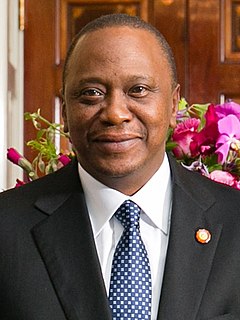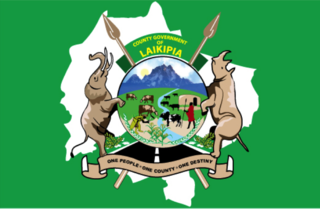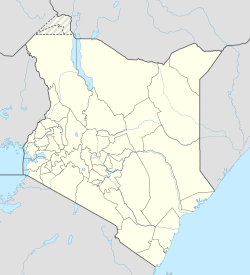
The demography of Kenya is monitored by the Kenyan National Bureau of Statistics. Kenya is a multi-ethnic state in the Great Lakes region of East Africa. It is inhabited primarily by Bantu and Nilotic populations, with some Cushitic-speaking ethnic minorities in the north. Its total population was at 47,564,296 as of the 2019 census.

Kenya, officially the Republic of Kenya, is a country in Eastern Africa. At 580,367 square kilometres (224,081 sq mi), Kenya is the world's 48th largest country by area. With a population of more than 47.6 million in the 2019 census, Kenya is the 29th most populous country. Kenya's capital and largest city is Nairobi, while its oldest city and first capital is the coastal city of Mombasa. Kisumu City is the third-largest city and also an inland port on Lake Victoria. Other important urban centres include Nakuru and Eldoret. As of 2020, Kenya is the third-largest economy in sub-Saharan Africa after Nigeria and South Africa. Kenya is bordered by South Sudan to the northwest, Ethiopia to the north, Somalia to the east, Uganda to the west, Tanzania to the south, and the Indian Ocean to the southeast. Its geography, climate and population vary widely, ranging from cold snow-capped mountaintops with vast surrounding forests, wildlife and fertile agricultural regions to temperate climates in western and rift valley counties and dry less fertile arid and semi-arid areas and absolute deserts.

Uhuru Muigai Kenyatta is a Kenyan politician who has served as the fourth President of Kenya since 2013. He served as the member of parliament (MP) for Gatundu South from 2002 to 2013. He also served as Deputy Prime Minister from 2007 to 2013. Currently, he is a member and the party leader of the Jubilee Party of Kenya whose popularity has since dwindled. Uhuru was previously associated with the Kenya Africa National Union (KANU) before founding The National Alliance (TNA), one of the allied parties that campaigned for his election during the 2013 general elections and later on went to form a merger with the William Samoei Ruto's United Republican Party (URP) to form the Jubilee Party. Uhuru's tenure has been marred by endless cases of corruption and impunity.
"Ee MunguNguvu Yetu" is the national anthem of Kenya.

Laikipia County is one of the 47 counties of Kenya, located on the Equator in the former Rift Valley Province of the country. Laikipia is a cosmopolitan county and is county number 31. The county has two major urban centres: Nanyuki to the southeast, and Nyahururu to the southwest. Its capital is Rumuruti. The County lies between latitudes 0° 18” South and 0° 51” North and between longitude 36° 11” and 37° 24’ East. It borders Samburu County to the North, Isiolo County to the North East, Meru County to the East, Nyeri County to the South East, Nyandarua County to the South, Nakuru County to the South West and Baringo County to the West.

Nanyuki is a Market town in Laikipia County of Kenya lying northwest of Mount Kenya along the A2 road and at the terminus of the branch railway from Nairobi. The name is derived from Enyaanyukie Maasai word for resemblance.

Lesbian, gay, bisexual, and transgender (LGBT) persons in Kenya face legal challenges not experienced by non-LGBT residents. Sodomy is a felony per Section 162 of the Kenyan Penal Code, punishable by 14 years' imprisonment, and any sexual practices between males are a felony under section 165 of the same statute, punishable by 5 years' imprisonment. While female same sex-sexual activity is not explicitly prohibited by law, lesbians, bisexual women and transgender persons, are not recognised in the Kenyan Constitution, and are discriminated against, covertly, as well as undergo corrective rape practices by heterosexual men. In addition, the country's gross indecency can be used against lesbian women who engage in same sex acts. On 24 May 2019, the High Court of Kenya refused an order to declare sections 162 and 165 unconstitutional. The state does not recognise any relationships between persons of the same sex; same-sex marriage is banned under the Kenyan Constitution since 2010. There are no explicit protections against discrimination on the basis of sexual orientation and gender identity. Adoption is prohibited to same-sex couples.

Kilifi County is a county of Kenya. It was formed in 2010 as a result of a merger of Kilifi District and Malindi District. Its capital is Kilifi and its largest town is Malindi. The county has a population of 1,453,787. It covers an area of 12,245.90 km2 (4,728.17 sq mi).

Kitui County is a county in the former Eastern Province of Kenya. Its capital and largest town is Kitui, although Mwingi is also another major urban centre. The county has a population of 1,136,187. and an area of 30,430 km2. It lies between latitudes 0°10 South and 3°0 South and longitudes 37°50 East and 39°0 East.

General elections were held in Kenya on 27 December 2007. Voters elected the President, and members of the National Assembly. They coincided with the 2007 Kenyan local elections.
The 2007–2008 Kenyan crisis was a political, economic, and humanitarian crisis that erupted in Kenya after former President Mwai Kibaki was declared the winner of the presidential election held on December 27, 2007. Supporters of Kibaki's main opponent in that election, Raila Odinga of the Orange Democratic Movement, alleged electoral manipulation. This position was widely confirmed by international observers, as being perpetrated by both parties in the election. Even the head of the electoral commission himself confirmed that he did not know who had won the elections despite announcing the incumbent as president.
Bonchari is an electoral constituency in Kenya. It is one of nine constituencies in Kisii County. The constituency was established for the 1988 elections. It has the following Sub County Riana County, Bomorenda county,Bomariba ward and Bogiakumu ward Bonchari is among the greatest constituency in Kenya Many People from Bonchari are Christian, eg SDA, Catholic and Pag. They have hard working people
There may have been minor settlement of Chinese people in Kenya as early as the 15th century; however, modern migration from the People's Republic of China to Kenya only dates to the late 1990s and early 2000s. There are estimated to be 50,000 Chinese people in the country.

Kisii County is a county in the former Nyanza Province in southwestern Kenya. Its capital and largest town is Kisii. The county has a population of 1,266,860 people. It borders Nyamira County to the North East, Narok County to the South and Homabay and Migori Counties to the West. The county covers an area of 1,317.5 km. The county is inhabited mostly by the Gusii people.

The counties of Kenya are geographical units envisioned by the 2010 Constitution of Kenya as the units of devolved government. The powers are provided in Articles 191 and 192, and in the fourth schedule of the Constitution of Kenya and the County Governments Act of 2012. The counties are also single-member constituencies for the election of members of parliament to the Senate of Kenya and special women members of parliament to the National Assembly of Kenya. As of 2013 general elections, there are 47 counties whose size and boundaries are based on the 47 legally recognised districts of Kenya. Following the re-organisation of Kenya's national administration, counties were integrated into a new national administration with the national government posting county commissioners to represent it at the counties.
Orders, decorations, and medals of Kenya are awarded by the President of Kenya "in recognition of outstanding or distinguished services rendered to the nation in various capacities and responsibilities". Awards are made by the president upon the advice of a National Honours and Awards Committee in the president's office. Individuals are nominated for awards by district committees, government ministries, religious organisations, non-governmental organisations, individuals and others. The Chief of the Order of the Golden Heart is the highest honour awarded by the Kenyan government.

In August 2012, a series of ethnic clashes between the Orma and Pokomo peoples of Kenya's Tana River District resulted in the deaths of at least fifty-two people. The violence was the worst of its kind in Kenya since the country's 2007–08 crisis, which left 118 people dead and more than 13,500 displaced - over 50% of the 13,500 were children, women and the elderly.

On Saturday, 21 September 2013, four masked gunmen attacked the Westgate shopping mall, an upscale mall in Nairobi, Kenya. There are conflicting reports about the number killed in the attack, since part of the mall collapsed due to a fire that started during the siege. The attack resulted in 71 total deaths, including 62 civilians, five Kenyan soldiers, and four attackers. Approximately 200 people were wounded in the mass shooting.

General elections were held in Kenya on 8 August 2017 to elect the President, members of the National Assembly and Senate. They coincided with the 2017 Kenyan local elections which elected Governors and representatives in the devolved governments.
The COVID-19 pandemic in Kenya is part of the worldwide pandemic of coronavirus disease 2019 caused by severe acute respiratory syndrome coronavirus 2. The virus was confirmed to have reached Kenya on 12 March 2020, with the initial cases reported in the capital city Nairobi and in the coastal area Mombasa.













